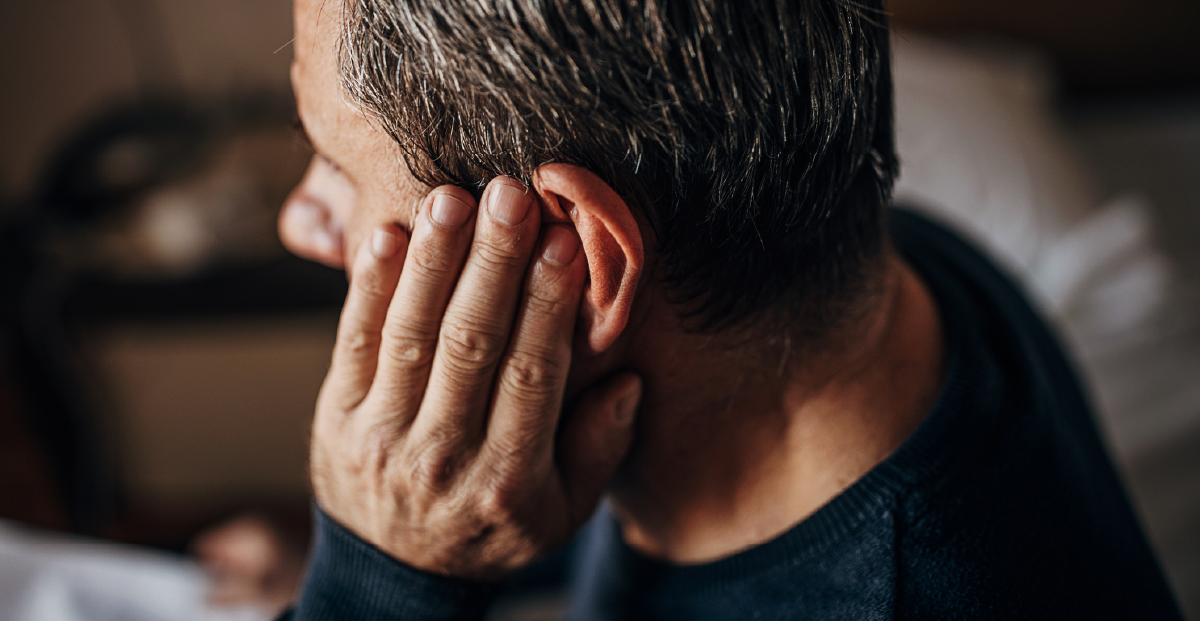
October 31, 2024
The Impact of Hearing Loss & What To Do About It
If you’re constantly turning the volume up, asking your wife to repeat herself or having trouble catching the play-by-play, those are signs of hearing loss you can’t afford to ignore.
October is National Audiology Awareness Month, and it’s the perfect time to face the facts: men are almost twice as likely as women to experience hearing loss among adults ages 20-69.
Hearing Loss: What’s the Big Deal?
Our ability to hear affects more than meets the eye. For a start, those with hearing loss are more likely to suffer from dementia.
Hearing loss may contribute to faster brain atrophy, negatively impacting memory. A study from Johns Hopkins found that mild hearing loss doubled the risk of dementia, moderate hearing loss tripled the risk of dementia, and those with severe hearing loss were five times more likely to suffer from dementia than those with no hearing loss.
Additionally, hearing loss impacts the ability to engage in conversation, contributing to social isolation. This may lead to depression, which is a common risk factor for dementia. A 2019 study found that people with hearing loss over the age of 65 are more likely to have depression than their peers without hearing loss.
Our brains also heavily depend on our vestibular system, located within the inner ear, to maintain balance. Hearing loss leads to fewer auditory signals traveling to our brain, causing the brain to process less spatial information. As a result, our equilibrium can be thrown off, resulting in an increased risk of balance issues, dizziness and falling.
“Many people don’t realize how closely our balance is related to our inner ear,” Dr. Brindley says. “Dizziness, vertigo, or unsteadiness are all signs you need to see a physician, who sends a referral for a visit to an audiologist. If you experience recurring ear pain or pressure in the ears that isn’t due to an ear infection, an audiologist can evaluate whether it’s related to a hearing or balance issue.”
All of these side effects amount to a loss of independence. By attempting to stay strong and brush off signs of hearing loss, you actually deprive yourself of the autonomy you’re after.
Hearing loss affects you physically, mentally and emotionally, and once the damage is done, it’s irreversible when caused by aging or prolonged exposure to loud noises. However, by acting now, you can preserve your hearing and slow its decline.
What Can I Do About Hearing Loss Right Now?
Talk to your Coryell Health primary care physician about seeing an audiologist. Dr. Brindley offers diagnostic hearing evaluations, hearing aid fittings and treatment for tinnitus (ringing in the ears).
Scheduling a hearing evaluation determines a baseline, and it’s easier to track hearing loss over time when there is data to compare. A hearing evaluation may seem inconvenient, but you’ll thank yourself for it later.
“Many patients try to ignore signs of hearing loss or are not aware of signs,” Dr. Brindley says. “These include persistent ringing, buzzing or hissing sounds in the ears. These can be a sign of hearing damage or another issue that an audiologist can help evaluate. If excessive earwax is causing discomfort, hearing issues or infections, an audiologist can safely remove it and check for any related hearing concerns.”
What Can I Do About Hearing Loss In the Future?
Using adequate hearing protection when exposed to loud noises reduces the risk of hearing loss. If you purchase custom hearing protection and are worried about its quality, Dr. Brindley can verify if your hearing protection is working properly.
For more ways to protect your hearing, take a look at some of Dr. Brindley’s hearing preservation tips.
Meet the Doctor
Dr. Ashley Brindley, Au.D., is an audiologist with over a decade of experience caring for both children and adults. She earned her associate degree from Victoria College and her bachelor’s degree in speech-language pathology and audiology from the University of North Texas. Dr. Brindley also received her doctorate in audiology from the University of North Texas. She’s certified by the American Speech-Language and Hearing Association, a Fellow of the American Academy of Audiology and a member of the Texas Academy of Audiology.

Healthy hearing positively impacts brain functioning, memory retention, the ability to connect with the world around you and so much more. Hearing loss in men may be more difficult to detect due to reluctance to admit symptoms of hearing loss. Admitting to signs of hearing loss isn’t weakness—it’s taking care of your health! Call (254) 865-2166 to ask about scheduling a diagnostic hearing evaluation with Dr. Brindley today.
 Skip to content
Skip to content
